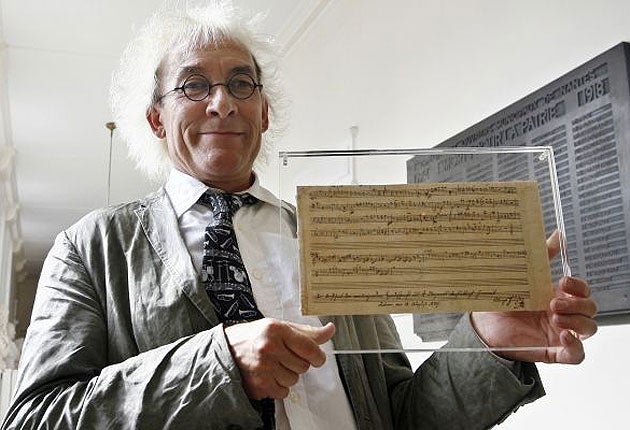Unknown 'Mozart fragments' uncovered

Your support helps us to tell the story
From reproductive rights to climate change to Big Tech, The Independent is on the ground when the story is developing. Whether it's investigating the financials of Elon Musk's pro-Trump PAC or producing our latest documentary, 'The A Word', which shines a light on the American women fighting for reproductive rights, we know how important it is to parse out the facts from the messaging.
At such a critical moment in US history, we need reporters on the ground. Your donation allows us to keep sending journalists to speak to both sides of the story.
The Independent is trusted by Americans across the entire political spectrum. And unlike many other quality news outlets, we choose not to lock Americans out of our reporting and analysis with paywalls. We believe quality journalism should be available to everyone, paid for by those who can afford it.
Your support makes all the difference.Two unknown fragments of music by Mozart are believed to have turned up in a library in Nantes in western France.
If authenticated by musical scholars, at least one of the pieces may be performed in a festival in the city next year.
A yellowing sheet of paper, held in the library since the 19th century, contains two or three lines of music, and a separate jumble of notes, signed Wolfgang Amadeus Mozart. The music had previously been assumed to be a rough draft, or copy, of extracts from two of the 626 known pieces by the 18th century Austrian composer.
A German expert concluded, after examining the sheet last year, that the Mozart signature is genuine and – more importantly – that the sonata and the religious music on the yellowing paper are unknown.
Ulrich Leisinger, the head of research at the International Mozarteum Foundation in Salzburg, Austria, said yesterday that the find was "really important."
The document has been owned by the city of Nantes since it was bequeathed by a local collector of original manuscripts, Pierre-Antoine Labouchère, in the 1870s. Mr Leisinger examined the paper, on a routine visit to the Mediatheque in Nantes last year, and found to his surprise that the music was unknown.
News of the discovery leaked to the local press yesterday. The city of Nantes had wanted to say nothing until Mr Leisinger's conclusions had been confirmed by other Mozart scholars and the music had been studied enough to allow it to be played.
The sheet of paper appears to contain the rough notes for two works by Mozart which were lost or never completed. One is a few lines of a "Credo" religious piece in D Major. The other is a jumble of notes, possibly forming a sonata.
Mr Leisinger said yesterday: "It's definitely Mozart's handwriting."Although it would take only a couple of minutes to play either work, it is hoped that Mozart scholars will be able to work up at least one of them into a piece of orchestral music to be played at a festival in Nantes next year.
The local newspaper, Presse Océan, which broke the news yesterday, spoke to a local pianist, Christophe, who had tried to play the two pieces.
He said: "It could be that they are intended as one work, maybe a sonata. Many notes are obliterated and you have to guess at them."
Join our commenting forum
Join thought-provoking conversations, follow other Independent readers and see their replies
Comments